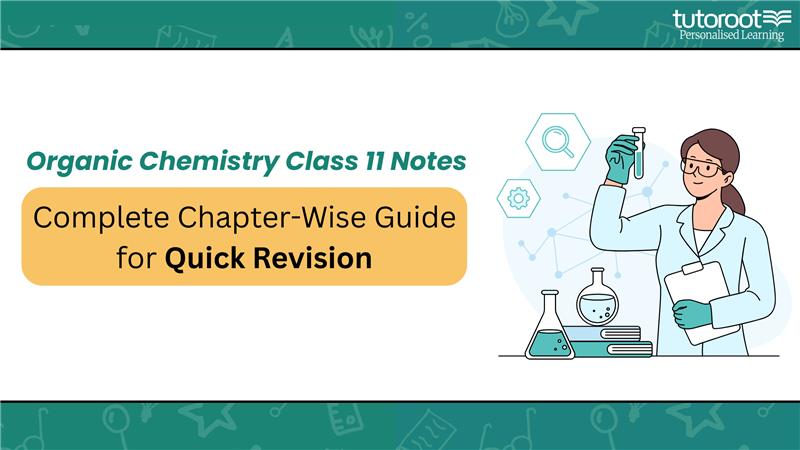Organic Chemistry Class 11 Notes: Complete Chapter-Wise Guide for Quick Revision

Organic Chemistry in Class 11 is one of the most important foundations for CBSE board exams and competitive exams like JEE and NEET. For many students, this part of Chemistry can feel confusing at first—but with well-structured notes and a clear understanding of concepts, Organic Chemistry becomes extremely scoring.
In this complete guide, you will find chapter-wise notes, important concepts, quick revision points, and must-remember rules to help you master Organic Chemistry with ease.
⭐ Why Organic Chemistry Class 11 Notes Are Important
Organic Chemistry is built on logic. Once you understand the rules and patterns, you can handle any reaction or mechanism confidently. Good notes help you:
-
Revise faster before exams
-
Understand mechanisms step-by-step
-
Remember formulas, rules, and reaction types
-
Strengthen your conceptual clarity
-
Solve application-based and competitive questions easily
Let’s go chapter by chapter for quick revision.
Chapter-Wise Organic Chemistry Class 11 Notes
1. Some Basic Principles of Organic Chemistry (SBPOC)
This chapter is the backbone of Organic Chemistry.
Key Concepts:
-
Classification of organic compounds
-
IUPAC nomenclature rules
-
Inductive effect, resonance, hyperconjugation
-
Types of reactions: substitution, elimination, addition
-
Reaction intermediates: carbocations, carbanions, free radicals
Quick Revision Points:
-
Understand priority rules for naming
-
Learn electron-donating and electron-withdrawing groups
-
Master stability order of intermediates
2. Hydrocarbons
Hydrocarbons include alkanes, alkenes, alkynes, and aromatic compounds.
Key Concepts:
-
Alkanes: free radical substitution
-
Alkenes: electrophilic addition reactions
-
Alkynes: acidic nature & addition reactions
-
Aromatic hydrocarbons: benzene structure & electrophilic substitution
Quick Revision Points:
-
Markovnikov & Anti-Markovnikov rule
-
Isomerism in alkanes and alkenes
-
Friedel–Crafts reactions
3. Organic Chemistry – Structural Representation & Isomerism
This chapter focuses on how molecules are represented visually.
Key Concepts:
-
Structural formulas
-
Newman & sawhorse projection
-
Conformations & stereoisomerism
-
Geometrical isomerism (cis-trans, E-Z)
Quick Revision Points:
-
Identify R/S and E/Z forms
-
Understand staggered vs. eclipsed conformations
-
Learn how to convert one representation to another
4. Classification & Nomenclature of Organic Compounds
Naming is essential for scoring well in Organic Chemistry.
Key Concepts:
-
Naming chain, ring, branched compounds
-
Functional groups priority order
-
Naming alkanes, alkenes, alkynes, alcohols, aldehydes, ketones
Quick Revision Points:
-
Memorize the functional group hierarchy
-
Practice naming mixed functional group compounds
5. Purification & Characterization of Organic Compounds
This chapter deals with separating and identifying organic substances.
Key Concepts:
-
Distillation, crystallization, chromatography
-
Elemental analysis
-
Qualitative detection of N, S, halogens
-
Quantitative methods (Dumas & Kjeldahl)
Quick Revision Points:
-
Know the purpose of each purification method
-
Understand chromatography types
6. Practical Organic Chemistry (Basic Laboratory Techniques)
Many competitive exam questions come from practical chemistry.
Key Concepts:
-
Melting point, boiling point determination
-
Tests for functional groups
-
Lassaigne’s test
-
Chromatography basics
Quick Revision Points:
-
Remember colour changes for common tests
-
Understand limitations of each method
How to Score Full Marks in Organic Chemistry Class 11
Here are a few practical tips:
✔ Make your own short notes
✔ Practice IUPAC naming every day
✔ Understand mechanisms instead of memorizing
✔ Revise reaction types repeatedly
✔ Solve previous year papers and NCERT questions
1. What are the most important chapters in Organic Chemistry Class 11?
Some Basic Principles of Organic Chemistry, Hydrocarbons, Isomerism, and Purification of Organic Compounds are the most important and highly scoring chapters.
2. How can I study Organic Chemistry in Class 11 effectively?
Focus on mechanisms, understand electron movement, practice IUPAC naming daily, and revise using structured notes and NCERT questions.
3. Are NCERT notes enough for Organic Chemistry Class 11?
NCERT covers the basics, but students need simplified notes, extra examples, and practice questions for strong conceptual clarity.
4. How do I memorize reactions in Organic Chemistry?
Don’t memorize—understand the logic, reaction mechanisms, electron shifts, inductive effects, and stability of intermediates for long-term retention.
5. Where can I get expert help for Organic Chemistry Class 11?
Platforms like Tutoroot offer one-to-one Chemistry tuition, expert notes, and personalised guidance to help you master Class 11 Organic Chemistry easily.
⭐ Why Tutoroot Is the Best Place to Learn Chemistry for Class 11
If you truly want to master Chemistry—not just memorize reactions or formulas—Tutoroot is the most trusted platform for Class 11 CBSE students. Our expert Chemistry faculty explains even the toughest concepts in a simple, visual, and easy-to-understand way. Students benefit from one-to-one online tuition, personalised doubt-clearing, chapter-wise notes, and exam-focused guidance that significantly improves their scores.
At Tutoroot, we believe that every student can excel in Chemistry with the right mentorship. Our teaching approach makes the subject logical, interesting, and stress-free. With structured notes, high-quality study material, and dedicated Chemistry experts, Tutoroot ensures strong conceptual clarity and consistent improvement.
Strengthen your basics. Build confidence. Score higher in Chemistry.
Choose Tutoroot — India’s Most Reliable Online Chemistry Tuition Platform.
Visit Tutoroot Social Platforms –


